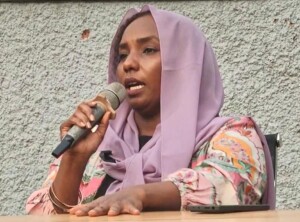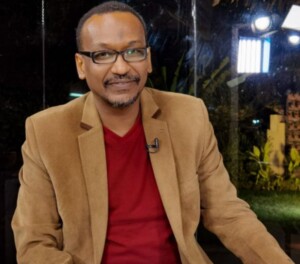USCIRF hails Sudan for progress on religious freedom
In its latest annual report, the United States Commission on International Religious Freedom (USCIRF) welcomed the “positive trajectory” in Sudan, and recommended the country for the US Department of State’s Special Watch List a category lower than before.
 Sudanese women in front of the All Saints Cathedral in Khartoum (File photo)
Sudanese women in front of the All Saints Cathedral in Khartoum (File photo)
In its latest annual report, the United States Commission on International Religious Freedom (USCIRF) welcomed the “positive trajectory” in Sudan, and recommended the country for the US Department of State’s Special Watch List a category lower than before.
A brave, grassroots protest movement brought down the Islamist-led regime of former president Omar Al Bashir in April [2019], followed by the establishment of a joint civilian-military transitional government four months later, the USCIRF states in its introduction.
The transitional constitution no longer identifies Islam as the primary source of law, and it includes a provision ensuring the freedom of belief and worship.
In November, the transitional government, which has engaged closely with USCIRF on religious freedom concerns, repealed the repressive Public Order laws that the former regime used to punish individuals, particularly women, who did not conform to its interpretation of Sunni Islam.
“While much work remains to extend full religious freedom to all Sudanese -including repealing apostasy and blasphemy laws- enough positive change has come to the country that, in this Annual Report, USCIRF is now recommending Sudan for the U.S. Department of State’s Special Watch List (SWL), a lesser category, rather than for CPC [Countries of Particular Concern] designation,” the report reads.
The report mentions “concrete moves to improve religious freedom” by the transitional government of Prime Minister Abdallah Hamdok, formed five months after the ousting of President Omar Al Bashir on April 11 last year.
“The new government informally allowed the Muslim-minority Republican Party to operate openly for the first time, and extended improved representation to what it deems “traditional” Christian communities, including the appointment of a Coptic Christian woman as a member of the Sovereign Council.
“While much work remains to extend full religious freedom to all Sudanese, enough positive change has come to the country that USCIRF is now recommending Sudan for the US Department of State’s Special Watch List, rather than for Countries of Particular Concern designation” – USCIRF
“Most notably, the government announced in December the repeal of a public order law that the former regime had used to enforce –often violently–it s Islamist vision of severe constraints on Sudanese society, with the harshest restrictions directed toward women and other vulnerable segments of the population.
“Transitional government officials also launched an ambitious program of outreach to domestic and international stakeholders to seek support for reforms. Senior officials from the Ministry of Religious Affairs and Endowments and the Ministry of Education, among others, visited some of Sudan’s long-marginalized peripheral areas.
“A high-ranking delegation visited Washington, DC, in December 2019; in the group’s meeting with USCIRF, Prime Minister Hamdok expressed his government’s commitment to implementing substantive improvements to religious freedom, including repealing the notorious blasphemy and apostasy laws –articles 125 and 126 of the Penal Code, respectively– in the near future.
“Later that month, the transitional government announced the designation of December 25 as a national holiday in celebration of Christmas, out of respect for the country’s sizeable Christian community.
In February, members of the USCIRF visited Sudan to assess religious freedom conditions, and met with the Prime Minister, other senior officials, and representatives of religious communities and civil society. Based on this visit, USCIRF determined that the transitional government has ended the former regime’s most egregious forms of religious repression, and reaffirmed its commitment to substantive change.
Sudan was designated as a Country of Particular Concern since the State Department issued its first CPC designations in 1999.
Radio Dabanga’s editorial independence means that we can continue to provide factual updates about political developments to Sudanese and international actors, educate people about how to avoid outbreaks of infectious diseases, and provide a window to the world for those in all corners of Sudan. Support Radio Dabanga for as little as €2.50, the equivalent of a cup of coffee.












 and then
and then